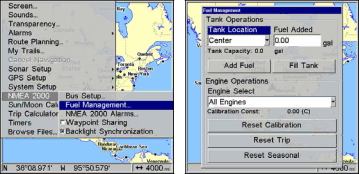
The Device Data for an
NOTE:
If, as in the graphic above, you do not have a Suzuki Engine Inter- face,
Fuel Management Menu
The Fuel Management menu gives you access to the following options: Tank Location, Fuel Added, Add Fuel, Fill Tank, Engine Select, Reset Calibration, Reset Trip and Reset Seasonal. Those options allow you to configure, calibrate, reset calibration, reset trip fuel and reset seasonal fuel for select NMEA 2000 devices. We will cover configuration and cali- bration procedures later in this section.
Fuel Management highlighted on the NMEA 2000 menu (left).
Fuel Management menu (right).
Tank Location
If you chose an
Fuel Added
Used in tandem with the Add Fuel command, the Fuel Added dialog box allows you to input the amount of fuel added to the tank, when an amount of fuel is added that does not fill up the tank.
